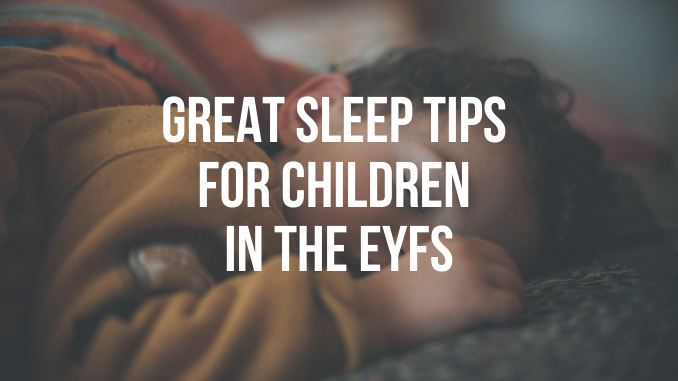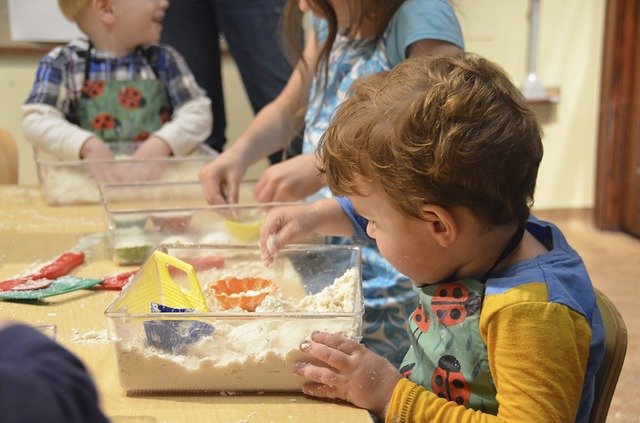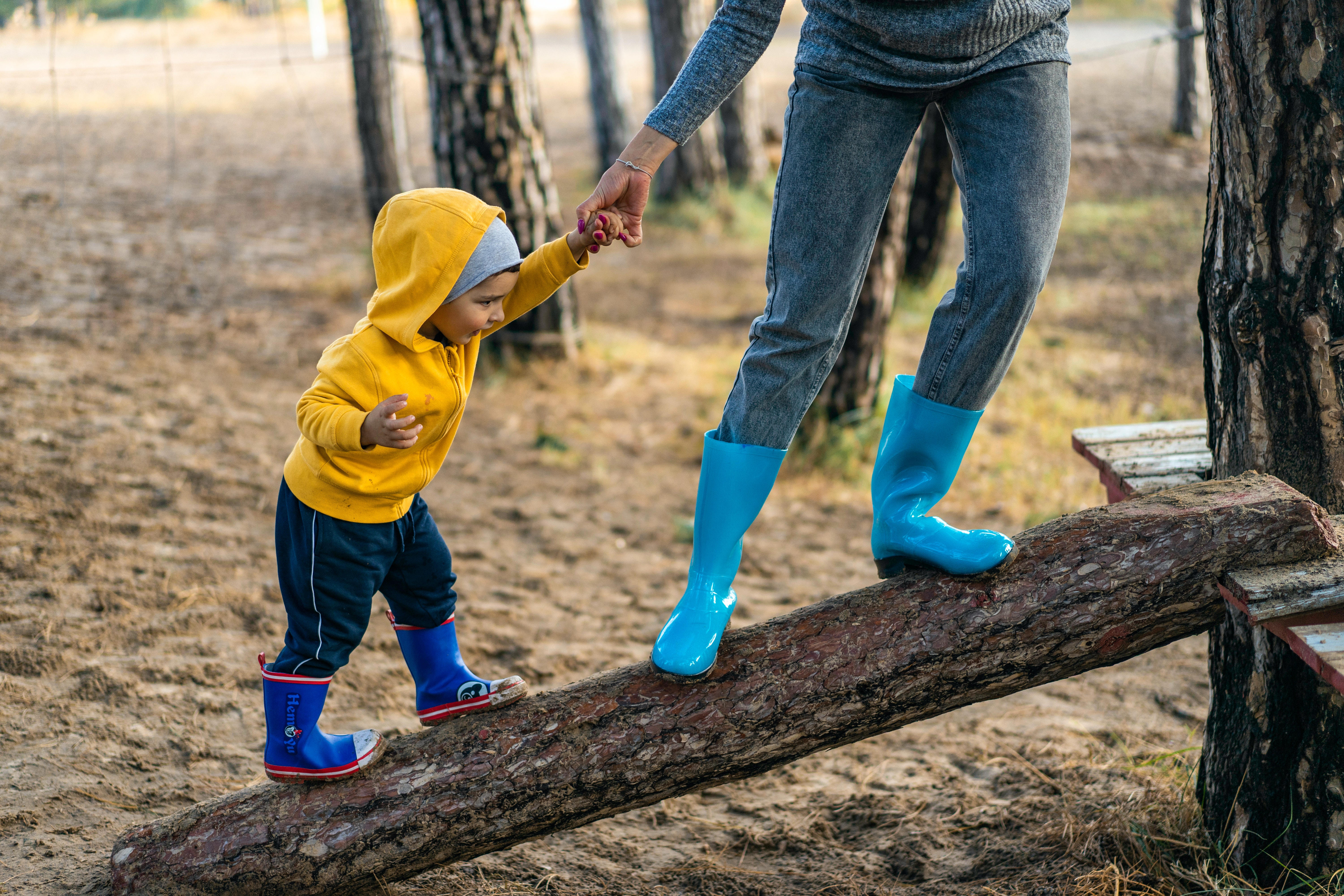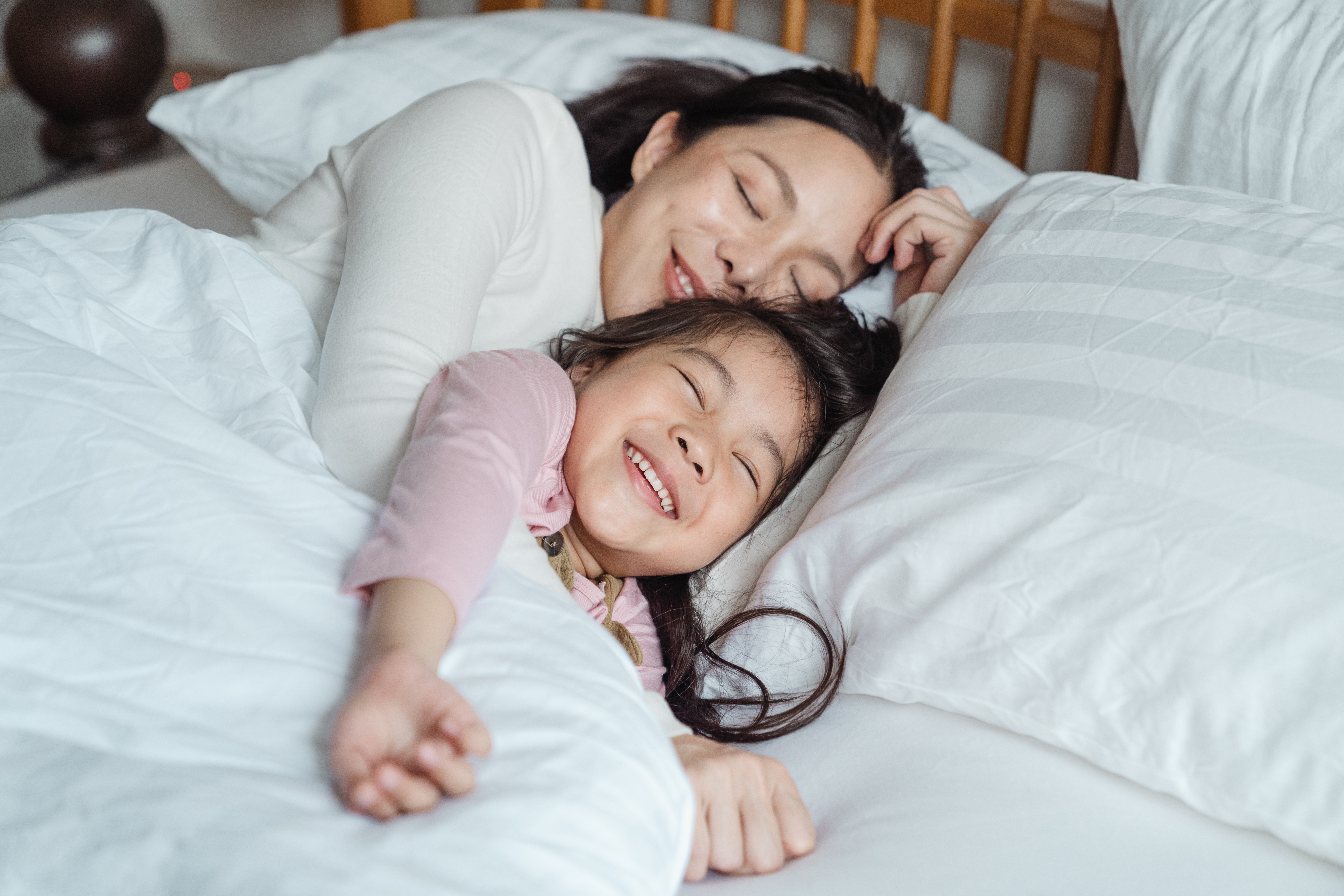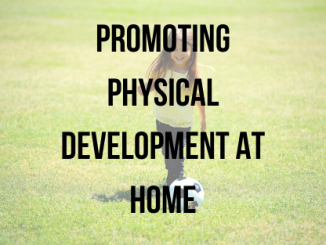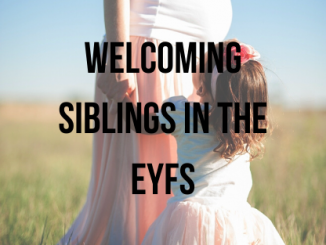Sleep is one of the biggest concerns reported by parents with children in the EYFS and with good reason; taking care of small children can be exhausting, add to that a lack of sleep or broken sleep and it can really begin to take its toll on families
Here many parents will turn to some of the countless books, sleep training programs and expensive products on the market in order to “train” a baby to sleep for longer stretches so that parents can too. However, the notion of Sleep Training is highly controversial and something that we would encourage parents to research in depth for themselves. Instead, here are some tips that might help without the need for an expensive ‘sleep program’
Realistic expectations
First and foremost, have realistic expectations! The fact that sleep “issues” are one of the most-often reported concerns for parents with young children should give a bit of a clue! Children who wake in the night are the rule, not the exception to it. In fact, most adults don’t “sleep through the night” in a solid 12-hour block, so it’s pretty unreasonable for us to expect our children to.
Babies and young children wake at night for a whole host of practical reasons; they may be hungry, thirsty, need the toilet, be too hot, too cold, have had a bad dream, have a tummy ache, be uncomfortable and so on. When adults wake for these reasons we are usually able to take some kind of action to fix the problem, for example getting ourselves a glass of water, going to the toilet or opening a window. Babies and small children don’t always have these options so they call out to their caregivers for help.
From an evolutionary perspective too, young children need their parents at night; our ancestors slept communally and shared “watch” duties at night time in order to keep everyone, including babies, safe (Worthman and Melby 2002) Leaving a baby elsewhere to cry would never have been considered in this type of setting and humans’ evolutionary past has left its mark on brains. It is natural and normal for human babies to want to be close to their parents; they are biologically hardwired to do so.
With all this in mind we can approach our children’s sleep with a more realistic expectation. That is not to say that we shouldn’t seek to improve sleep, because of course it is important that parents are able to get the rest they need too, just that our expectations may need to be adjusted.
Work with circadian rhythms
Circadian rhythms, or the ‘biological clock’ is designed to regulate the timings of sleepiness and wakefulness as we go through 24hour periods. Interestingly the light/ dark cycle of the day and night have a profound effect on our circadian rhythm which can lead to some adults feeling a bit off-kilter in the darker winter months, and children rising far too early in the longer summer daytimes! However, if we work with the effects of daylight we can help children and ourselves to sleep better during the nightime.
Daylight is what helps to set our natural circadian rhythm and sleep-wake schedule. Exposure to natural light in the daytime, particularly in the late can help to improve children’s sleep. So can avoiding artificial light before bedtime. Blue light signals to the body that it’s time to wake up, and is disruptive to the production of hormones needed for sleep. This is the kind of light found in many of our homes, and on electronic devices. Most experts advise switching off devices for a couple of hours before bedtime, or, if you must use them, employing the use of blue-light filters. For children, many of the nightlights marketed use blue-light, so consider swapping to a nightlight using red tones of light instead or something like a Himalayan salt lamp.
Rich, sensory input
We often worry about overstimulating babies and toddlers and this is certainly a possibility when we run around frantically from one thing to the next. However, something that is beginning to be talked about more is the possibility that babies, toddlers and young children need adequate rich, sensory input during the day in order for them to sleep well at night.
The Possums Approach is certainly worth looking into as an alternative to traditional sleep training, and recognises the importance of sensory input, explaining that many parents report that their baby, toddle or child quickly settles down when taken outdoors or into a new environment where there is more for them to see, hear and do. Indeed, many parents report that their little ones sleep especially well after a busy day at nursery where they have had this kind of rich, sensory input,
Time outdoors
Spending time outdoors is good for children and adults, and one of the ways that it benefits us is that it promotes good quality asleep. Along with exposure to natural sunlight, spending time outdoors can help to burn off excess physical energy (even for babies who aren’t walking, as the body will work harder to regulate temperature and so on) which increases sleep pressure and fresh air effects the types of hormones and chemicals in our brains, which in turn can lead to better sleep.
Connection
Some children wake in the night for connection. This can be especially true when there is a new sibling in the house. It’s not usually a very effective technique as it frustrates parents but if your little one is waking frequently at night it might be that they need more connection during the day. Playing together before bed, or cuddling up and reading stories is a great way to make sure that a child’s need for connection is being met.
Sleep space
Where your child sleeps can impact what their sleep looks like. The western world makes a big deal about children having their own bed, or their own room, but again this is something that goes against children’s natural instinct. In times gone by it would have been natural for whole families to sleep together, and we see this in children’s desire to sleep with their parents. Safe co-sleeping might be one way for everyone to get the sleep they need, conversely some children do sleep better in their own space. This might be something to experiment with.
Use the senses
There are plenty of ways to use the senses to help children to fall asleep, and get back to sleep if they wake. We’ve looked at ways to use light to help children fall asleep, sound can be comforting too; many parents have great success using white noise with babies and younger toddlers but even playing lullabies or audiobooks can help signal that it’s time to sleep. Essential oils can be useful too, perhaps try massaging your baby, or giving your pre-schooler a foot rub using relaxing essential oils like lavender; the smell of certain oils can help to relax and calm children ready for bed. When it comes to touch, perhaps consider the materials that your child is sleeping in- their pyjamas and bedsheets can make a big difference at this age. As can things like the temperature and humidity in their room. Again, different things will suit different children so you will need experiment.
 Find your village
Find your village
There is a lot of information available to weigh up around the subject of sleep. Reframing our expectations of sleep for children in the EYFS so that it is in line with what is biologically normal, rather than our cultural expectations can be especially helpful
When we do this, it becomes apparent that most children do not have a ‘sleep problem’ just that biologically normal infant sleep is culturally inconvenient. Our lives as parents are busier than ever, in many homes both parents are required to work outside of the home whilst simultaneously raising children and housekeeping, and so our focus shifts onto getting the baby to sleep so that our lives can continue to function.
Perhaps it is not that children don’t sleep “well” but rather that parents expect too much from young children because in turn society expects too much from them. Shifting the focus onto ways to support the parents through a trying, but biologically normal, phase of life may be a more positive way of dealing with the situation.
Humans were never meant to raise children alone, the well quote proverb “It takes a village to raise a child” is biologically true. Unfortunately, most parents now find themselves away from family, and lacking a village or tribe with whom to share the burdens (and joys!) of raising children. Looking for support systems in our modern world is more crucial than ever.
References:
Worthman, C. M. & Melby, M. (2002) Toward a comparative developmental ecology of human sleep. In: Adolescent Sleep Patterns: Biological, Social, and Psychological Influences, M.A. Carskadon, ed. New York: Cambridge University Press, pp. 69-117.

